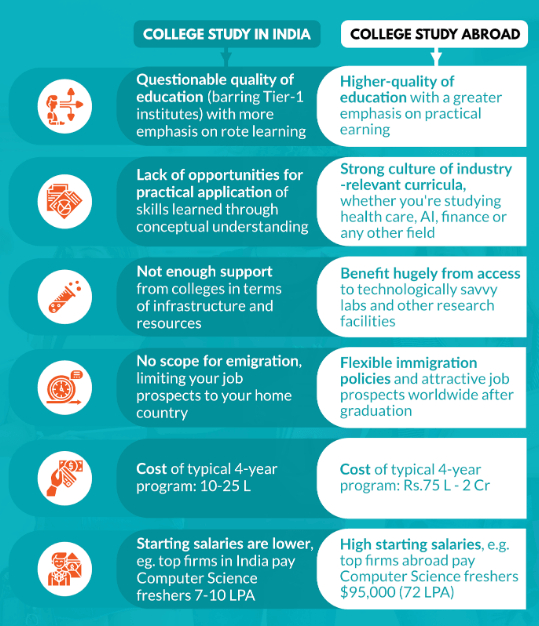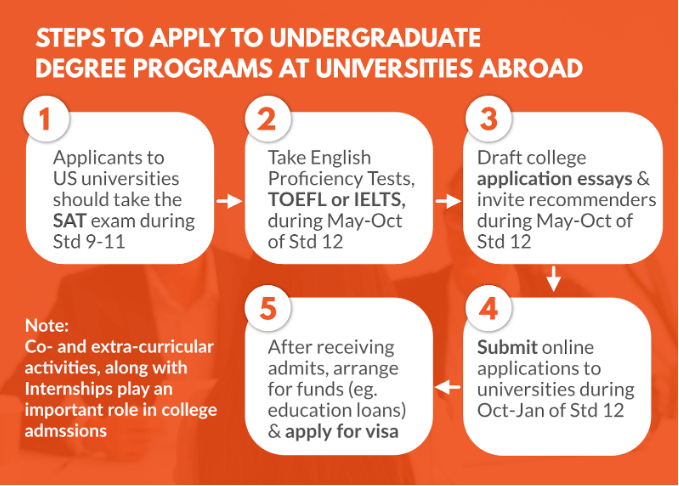
Why Biden's Win Is Great for Indian Students Looking to Study in the US
Table of Contents
1. Should students consider doing an undergraduate degree abroad?
How does an international undergraduate student experience differ from its Indian counterpart in terms of the education system, curriculum, faculty, infrastructure, peers, job opportunities & cultural factors?
Our response is a resounding YES! Firstly, an undergraduate degree from a good university abroad gives students access to quality education systems with practical and customizable curriculums. By and large, the resources available to students, as well as the prospects for innovation and research, far surpass those available to students studying in India. These opportunities give students who study abroad a definite edge over their peers, making them attractive candidates in the competitive job market.
While most Indian universities emphasize rote learning (which can be achieved by last minute study), universities abroad impart application-oriented learning. Weekly assignments ensure that students are busy learning throughout the semester, and examinations are typically open-book, or even take-home. This approach not only helps students retain the concepts taught in their courses, but also gain valuable technical skills by applying these concepts in relevant projects that count towards one’s grades. Moreover, universities abroad are equipped with state-of-the-art technology and extensive research facilities that allow students the opportunity to undertake groundbreaking research to further their academic and professional growth. The faculty at these universities are also highly experienced, proficient in, and passionate about their fields, and hence, can effectively guide students in their chosen career paths.
Universities abroad also tend to grant more freedom and flexibility to their students, in terms of academics. The curriculum is often structured such that students can often enroll in courses from different departments before deciding their majors. In fact this is a major difference when compared to Indian universities, where even in the IITs, one’s major (i.e., department or branch) is typically fixed at the time of admission to the course. Having the flexibility to choose one’s major helps students gain a broader perspective and allows them to choose the career path for which they are best suited. In addition to taking a variety of courses across diverse disciplines, students also have the option of concurrently majoring in multiple areas, such as Economics and Computer Science, or Business and Psychology, according to their interests. This equips them with a unique and potent set of skills, which once again increases their marketability. Further, if students find that their major is not what they expected or if they prefer another course, then students have options to switch majors as well. Such flexibility is typically not granted to students in India.
Another significant benefit of studying abroad is the potential career opportunities that come with it. Not only does an overseas education increase your job prospects back home, but it also makes you a more attractive candidate for international employers. A student whose educational experience is restricted to India would be less appealing to a prospective employer, as compared to a student who has received a global education and is well-versed in a foreign work culture and system. Moreover, the remuneration from international employers is substantially higher. For example, the starting salaries for Computer Science grads is around US $95,000 (72 LPA) at top American firms. On the other hand, Indian employers, or for that matter even MNCs recruiting for their Indian offices offer considerably lesser pay, with leading companies offering a starting salary of around Rs.7-10 LPA.
Finally, studying abroad can improve one’s personal development. Due to the professional work ethic and exposure to a diverse, global environment, students who have studied overseas have better communication and leadership skills. They also gain essential critical thinking skills and soft skills as a result of the international education system. Hence, they are better placed for success in professional careers.
There are no limits to the benefits of studying abroad. If a student were to effectively utilize all the resources available to them and take advantage of the infinite opportunities offered by an overseas education, then he or she will not only be an enviable candidate in the competitive global job market but also emerge a well rounded individual with stronger soft skills compared to their Indian counterparts.
2. Is the application process complex? What are some of the main challenges to navigate during this process? When is the right time to start the process?
Applying to undergraduate studies abroad is quite different from applying to college in India. Universities abroad look at a candidate’s overall profile and not just their school grades/marks/standardized test scores. Good universities look at the candidate holistically and consider all the below aspects like:
- High school grades and rank in school or class
- Standardized test scores (e.g. exams such as the SAT or ACT)
- English proficiency scores (e.g. tests such as the TOEFL or IELTS)
- Extra-curricular activities (e.g. sports, music, arts) not merely as hobbies but with excellence and passion evidenced by sustained achievements and titles won.
- Leadership qualities demonstrated during school years
- Community service and impact on local communities
- Competitions that they may have qualified for (example Math or Physics Olympiads)
- Internships or summer programs that they may have participated in
- Recommendation letters that outline the student’s strengths with examples
- Well-written essays that outline the student’s passion, abilities and why the student is a great candidate for that particular school
- AP (Advanced Placement) courses that indicate how well the student can take a college level workload
As you can see, building a good applicant portfolio for applying to universities abroad for undergraduate studies takes work. Hence, we recommend that students start planning for college early (as early as in 8th or 9th grade) giving them adequate opportunity to take up extra-curricular achievements, advanced courses, summer programs, activities, and internships.
Test prep for standardized tests will also require time, though nowhere near what the JEE requires. We recommend taking standardized tests like the SAT as soon as the student is prepared and feels ready. SAT scores for example are valid for 5 years. As exams like the SAT and ACT do not test very advanced concepts, we recommend students taking them as early as the 9th/10th grades so that they can get it out of the way and focus the remaining years on building other aspects of their profile (extracurricular activities, AP courses, Community service etc). Taking these tests early also gives students the opportunity to retake the test in case they do not do well the first time. Keep in mind that the regular school curriculum also tends to get more hectic for students as they go to higher grades.
Since college applications are due between October and January of one’s 12th grade, to be a successful applicant, you should have all the application materials ready at least one month prior to your application deadlines. This ensures your test scores (SATs, APs, school/board certificates) and recommendations to reach universities in a timely manner. However, as mentioned earlier, there is a lot of preparation required to build a student’s overall profile and portfolio in the years prior to the application.
Our general recommendation for parents is to create a profile with your kid’s achievements to date. This is your “As-Is state” Next, think through the universities/majors that your child might be interested in. Then try and think through activities/courses that would make your child’s profile stronger. This is your “Future state” profile.The output of this exercise should be an action plan with key milestones including courses, summer programs, activities, and internships that you can work towards. You can also seek professional help with an experienced counsellor to work through the above exercise.
3. What is the cost of undergraduate education abroad? Is the ROI worth it?
The cost of undergraduate education abroad can cost anywhere between Rs.75 lakhs to 2 crores per child depending on the country, the location within the country, and the university itself. For example, in the US, the costs can vary from state to state. Costs also vary depending on whether the university is a public university or a private university. Some states like Texas for example boast of a good university system where tuition costs and cost of living also tend to be lower compared to universities in a state like California.
Compared to the US, the cost of undergraduate education in Canada is lower, and Singapore, even more so. Germany is the least expensive, for its universities offer tuition at almost zero cost, and so one only has to factor in living expenses.
In terms of the return on investment, one needs to look at the long term ROI from the degree in terms of opportunities that it can create over a lifetime for the student. For career success over the long run, both soft skills as well as depth in one’s area of expertise matter. Moreover in today’s age of globalization, exposure to different cultures and the ability to work with diverse teams matters. A student is exposed to all of the above during the course of an undergraduate degree abroad. Also, most good universities abroad have a great alumni network globally that students can continue to leverage.
One piece of advice we offer parents is not to look solely at the immigration/work visa aspect when sending your child abroad. Look at the brand value of university/degree and also opportunities in the specific field that your child is going to study in. Immigration policies vary based on the government or political party in power today and may not necessarily hold true if the opposition comes to power. However, the brand value of the university/degree will hold true for a lifetime.
As a general rule of thumb, STEM fields (Science Technology, Engineering & Mathematics), especially in areas like computer science, data science, artificial intelligence, etc. have a great ROI due to high starting salaries and shortage of skill sets today. However,we recommend parents to not just choose a field based on the immediate ROI but based on their child’s interests and aptitude. Also, in the US for example, students can often choose their specialization after trying out courses from diverse departments. One can also simultaneously major in two areas like business and computer science, which can open up unique opportunities for a successful career.
For non-STEM fields, a degree from a good university abroad can open up great opportunities in one’s home country or even in other countries with a large international workforce such as Singapore, Canada or Australia. In the early stages of a career, the quality of your work and the companies that you work with matter the most. This work experience can set the stage for great opportunities both within and outside the home country later.
4. What are some popular destinations for undergraduate studies abroad?
The US is obviously a popular destination due to the large number of quality universities and programs available for students. It is also the world’s largest economy, and the nation with the most number of opportunities available in emerging areas like Robotics, AI, Data Science and Healthcare. Graduates from US universities are also able to tap into opportunities available globally due to the incredible brand value of the degrees from the good universities there.
Due to friendlier immigration policies, Canada has also become a popular location among Indian students in more recent years. However, one has to remember that while Canada has some good universities (e.g. University of Waterloo and University of Toronto), the number of Canadian universities is much lesser than the US and so is the size of the economy. The same holds true of Australia. So while immigration policies might be friendlier, the number of job opportunities are lesser than the US, as the overall size of the economy is much smaller.
The UK has always been a popular choice among Indian students for undergraduate studies. Ease of access from India and a long history of Indians studying in the UK make this a popular choice for Indian students. Recent modifications allowing international students to stay on longer post graduation have also made the UK more popular in recent times. The one caveat is the impact of Brexit on the UK economy in the future.
Many European countries, such as France, Spain, Finland, Ireland, and the Netherlands have also started becoming increasingly attractive to international students in recent years. Germany, as mentioned earlier, is very tempting due to its zero tuition fee for college students.
Singapore is also an attractive destination for Indian students, owing to its relatively high quality and low cost of education, geographical proximity to India, and large international workforce.
5. Can I also try applying to Indian colleges at the same time, just to be safe?
Yes, one can definitely consider applying to Indian colleges at the same time and keep options open. One of the key factors for students is whether they are getting the branch or department of their choice in a good university in India. Often in India, students get allocated majors based on their performance in an entrance exam (whose questions may not even discern one’s aptitude for a particular department) and not on the basis of their interest or inclination. For example, most engineering entrance examinations in India (including the JEE) evaluate students on Mathematics, Physics, and Chemistry, and then use this performance to “allocate” Computer Science to some students, and Mechanical or Civil Engineering to others. Such a rationale would be unthinkable at universities abroad.
Some Indian universities also offer a “Twinning option”, whereby students study in India for 2 years and then transfer to a university abroad to complete their remaining 2 years. They get their final undergraduate degree from the university abroad. Manipal University is one such university that offers this option for engineering programs. They have had this option since 1994 and several students have availed of this option with universities in countries abroad. There are other well known private universities that offer similar opportunities to students, and parents need to check for which departments offer twinning programs, and which specific foreign universities they have partnered with.
About the Author

Earning one’s academic degree abroad is truly a life-transforming experience. There are significant personal, academic, and of course career benefits to studying abroad. However, while many are aware of what it takes to do a Master/PhD/MBA abroad, few Indians have an understanding of pursuing undergraduate studies overseas.
In this article, Pavithra Srinivasan, Stanford alumna and founder of Galvanize Test Prep & Global Admissions Counselling, sheds light on this increasingly popular trend that parents, students and teachers are curious about.











